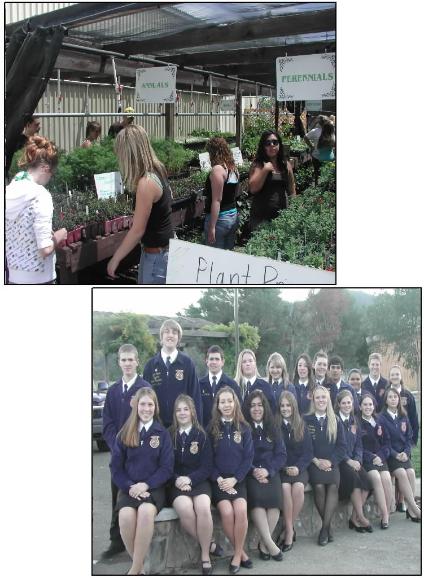What is offered at your local Agricultural Education/CTE
Get Focused Stay Focused - Dual Enrollment Course -This course is designed to help students foster academic success in their high school years and to aid in successfully reaching life goals set by the individual student. This course introduces students to a decision-making process that will help them envision and plan for a future career that is productive, achievable, and stimulating. This personalized 10Year Plan provides students with the focus and intrinsic motivation to succeed in high school, college, at work and in life. Students may use this as the first course or class for any of the Horticulture Pathways.
Ag Skills - elective credit. Successfully learning how to operate the school farm; using hand tools, electrical tools, plumbing, carpentry, fence building, cement work, heavy equipment, aiding teachers in the classroom, and much more.
Introduction to Viticulture - Meets College-Prep Elective (G)/Science-Biology/Life Sciences credit. Includes history and development of the wine industry, grape growing, distribution, processes & factors affecting wine quality. This course covers biology, anatomy, propagation, cultivated varieties, rootstocks, climate, vineyard practices, and common diseases and pests. Provides knowledge required to establish a vineyard in Lake County.
Vineyard Management - College-Preparatory Elective (G) / Science – Integrated Science. This course is designed for students already familiar with the basics of viticulture. A student project will be completed using geological survey data, evaluating a real site for its potential as a vineyard. Students will develop an establishment plan and create a water management strategy based on soil properties and climate of a selected site. A task management plan will be developed for a year including specific strategies for management of weeds, vertebrate pests, insects, and diseases. Lecture topics covered will include canopy management, foliar sampling, sustainable management practices, and how cropping systems affect vine vigor.
Introduction to Entomology & Weed Science - Science (D)/Biology/Life Sciences -Students will develop a cumulative understanding of general entomology (BUGS) principles including, structure, function, taxonomic classification and ecology. Students will have the opportunity to develop skills necessary to identify and understand implications for economically important insect orders, families, genera and species.
Students will learn how to identify plants, explain modes of spread and describe population ecology of weeds and other invasive plant species. Emphasis will be placed on sustainable management utilizing an integration of biological, cultural, mechanical and chemical manipulations of weeds and invasive species. Methods of crop and vegetation management to manage and reduce weed populations will be discussed.
Entomology in the Field-Elective Credits- This course is developed to bridge the gap between school and the industry sector; introducing students to the local workforce, working side by side with experts in the field. OR (students will be matched with an internship that will fit their educational needs and where they will prosper)
Organized instruction in written and oral communication will acquaint students with private and public-sector companies and agencies as well as leading professionals from these firms, reinforcing academic instruction, thus preparing students for the transition to employment. Students will study independently, being supervised in field experience related to a professional area of interest in entomology. It will be the student’s responsibility to seek out and identify an internship opportunities from the list of prospective companies participating in this program for their credit.
Horticulture - College credits/Dual Enrollment - Students will gain understanding of fundamental principles of growth, structure, nomenclature, scientific method, and the use of horticulture plants. Course includes introduction to ornamental crops, orchards, vegetable gardening propagation and landscaping.
Ag Marketing - College credits/Dual Enrollment - This course is for people who want to add a business management foundation to a technical major from the College of Agricultural Sciences. The combination of your technical and business management skills is what employers most desire when they look for potential employees.
Regardless of your major, most people find themselves as business managers some time during their careers managing time, money and people. When you complete Ag Business Management successfully you will have a solid knowledge of the critical agribusiness skills and their application so you will be able to handle just about any management situation you may encounter. No prior business experience is required or expected to succeed in this course.
Leadership - Only open to chapter officers
SAE Project Record Book
This record book is a member's key to success in the FFA...that is your FFA degrees & awards, access to FFA scholarships, demonstrating your entrepreneurial business skill, and keeping track of your involvement in leadership development activities. |
Note: https://www.theaet.com/Login.aspx?ReturnUrl=%2fAET%2fProfile%2f
Chapter: CA0532

Get the complete Agricultural Education experience!!
The National FFA Organization - is a dynamic youth organization within agricultural education, that prepares students for leadership, personal growth and career success. It is a learning tool to strengthen the "Hands-On" part of the high school agricultural education curriculum.
Supervised Agricultural Experience Program - Each student is required to plan and maintain a project related to their agriculture program. They are also required to keep records on transactions related to their project (i.e. hours, receipts, expenses).
Supervised Agricultural Experience Program - Each student is required to plan and maintain a project related to their agriculture program. They are also required to keep records on transactions related to their project (i.e. hours, receipts, expenses).
"Learning by doing" part of the curriculum.
Advisors and Project Areas ~
Horticulture: GetFocusedStayFocused, Floral, Viticulture
............................ Karen Jones, ext 4040
Ag Science Courses; Ag Bio, Ag Chem, Ag Physics, Animal Anatomy & Physiology, Vet Science
Ag Science Courses; Ag Bio, Ag Chem, Ag Physics, Animal Anatomy & Physiology, Vet Science
............................ Katelyn Ramos, ext 4003
Agriculture Mechanics I, II, III
........................... Clayton Croman, ext 4038